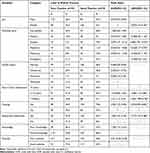Back to Journals » Nursing: Research and Reviews » Volume 12
Factors Associated with Nursing Code of Ethics Practice in Gurage Zone, SNNPR, Ethiopia, 2022
Authors Haile TG
Received 18 May 2022
Accepted for publication 8 August 2022
Published 13 August 2022 Volume 2022:12 Pages 135—145
DOI https://doi.org/10.2147/NRR.S373146
Checked for plagiarism Yes
Review by Single anonymous peer review
Peer reviewer comments 2
Editor who approved publication: Dr Natasha Hodgkinson
Tariku Gebre Haile
Department of Nursing, College of Medicine and Health Sciences, Wolkite University, Wolkite, Ethiopia
Correspondence: Tariku Gebre Haile, Tel +251 917411183, Email [email protected]
Introduction: Ethical codes are a set of systematic binding and guiding rules defining morally acceptable ethical behavior. The nursing profession is the backbone of the medical industry and the front-line healthcare service providers. Nowadays providing ethically competent, compassionate and respectful care is highly essential.
Objective: Determining Factors associated with nursing code ethics practice among nurses working in Gurage zone hospitals, 2022.
Methods: From February 1 to March 30, 2022, an institution-based cross-sectional study using the non-probability convenient sampling method was used to choose the study participants. Pretested self-administered questionnaires were used to collect data and entered using Epi info 3.5.1 versions, then exported to SPSS version 23 for analysis. Bivariate and multivariable logistic regression analyses were employed to identify associated factors. Variables having a P-value of < 0.05 in the multivariable logistic regression model were considered as significantly associated variables.
Results: This study was completed through 413 study participants with 97.86% response rate. Fifty-three percent of nurse practitioners were found to adhere to the nursing code of ethics. Sex [females] (AOR [95% CI] 3.69 (2.14– 6.36)), working ward [surgical ward] (AOR[95% CI] 4.84(1.94– 12.06)) and [pediatrics ward] (AOR[95% CI] 0.36(0.17– 0.77)), Years of working experience [5– 10 years] (AOR[95% CI] 2.08 (1.13– 3.84)) and work experience [> 10 years] (AOR [95% CI] 3.49 (1.798– 6.76)), nurses who had training (AOR[95% CI] 5.02(2.85– 8.83)) and nurses who had frequent supportive supervision system (AOR[95% CI] 2.27(1.29– 3.98)) were factors that associated with nursing code of ethics practice.
Conclusion: In this study, over half of the nurses practiced the nursing code of ethics in a professional manner. Nursing code of ethics practice was substantially correlated with factors, sex, working ward, years of experience, training, and regular supportive supervision. Therefore, it is strongly advised that all parties involved implement a regular supporting supervision system and give up-to-date training to staff nurses.
Keywords: code of ethics, practice, knowledge, attitude
Background Information
Every individual has a distinct set of morals and beliefs. Ethics are moral rules that specify how an individual or group of individuals should act or behave.1 Although nurses have always been expected to give the public and healthcare consumers the best care possible on the premises and believe that their work promotes respect for life, human dignity, and other people’s rights, they also need to be aware of problems with healthcare delivery, make morally acceptable and wise decisions based on their beliefs, and uphold professional ethics.2 The nursing code of ethics acts as a legally binding and regulating norm for patient care, research, and decision-making.3 However, ethical issues can arise in any healthcare circumstance when fundamental moral judgments of “good” or “wrong” are used.4 In order to minimize this ethical gap, the International Council of Nurses (ICN) published the first global code of ethics for nurses in 1953.5 The two national codes of ethics for nurses prepared by the American Nurses Association (ANA)6 and Canadian Nurse Association (CAN)7 are examples. Following this, every country including Ethiopia had adapted or adopted it to use it for directing nursing practitioners professional ethics.
Literatures described that there are different factors affecting nursing code of ethics practice. According to research done in various nations, there are knowledge, attitude, and nursing code of ethics practice gaps which may lead to breach of nursing ethics. As a result, patients were admitted to hospitals against their will, given incomplete information, and made to stay in hospital against their will.8
Even several studies showed that nursing professionals who had enough and acceptable knowledge of nursing ethics,9–11 their application of nursing ethics on real clients was not at a suitable level.9–11
Other studies indicated a statistically significant correlation between nurses’ understanding of professional ethics)9, their age, gender, and monthly income,12 and their practice of nursing ethics. In addition, professional qualification, years of experience, and rank had an impact on nurses’ knowledge, attitudes, and practices regarding nursing ethics.13 Furthermore, another study found a substantial correlation between awareness and attitude.14
Additionally, some research revealed that nurses with enough knowledge of ethical practice also engaged in adequate nursing ethics practice.12 Contrary to these, the results of other investigations, however, indicated that there was no relationship between knowledge and nursing ethical practice.11,15
Patients’ expectations, cultural barriers, care imbalance, compromised nursing care, a lack of amenities, poor teamwork, unequal workload, and poor value given to nursing profession16 were cited as contributing factors to breach of the nursing code of ethics practice. Periodic workshops, use of hospital policies, and personal development were also identified as potential solutions in a Nigerian study.13
Although the Ethiopian National Code of Ethics for Nurses was developed with the intention of better serving the interests and needs of patients and the profession, to the best of my knowledge, there are no research findings that demonstrate the gap for stakeholders. Nursing ethical issues consequently received little attention, which caused moral discomfort, poor professional care, inefficiency and conflicts of interest, job discontent, and unnecessarily high rates of burnout among nursing workers. Thus, determining the nursing code of ethics practice and its associated factors is the aim of the current study.
Methods and Materials
Study Setting and Design
The study was conducted on nursing practitioners working in seven public hospitals found in Gurage Zone Southern Nations, Nationalities, and People’s Region 158 km away from the capital city of Ethiopia, Addis Ababa, from February 1 to March 30, 2022 using Institution based cross-sectional study design.
Population and Sampling
The sample size was calculated using a single population proportion formula with the assumptions of 50% proportion (p), since there is no similar study, 95% confidence level (z), and 5% margin of error (d). Here is the computation:
Adding 10% for non-response the final sample size was 422.
The study population was almost equal with sample size calculated above. Hence, all actively working nursing practitioners in Wolkite University specialized teaching hospital (107), Butajira General Hospital (151), Bue (44), Quante (26), Atat our lady of Lourdes catholic (26), Agenda(24), and Gunchire (35) primary hospitals were included in this study. Nursing practitioners who are on leave (maternity, annual, sick, fieldwork) during the study period were excluded in this study.
Study Variables, Tools, and Data Collection Procedure
The outcome variable for the study was nurses’ ethical code of practice. The independent variables for the study were sociodemographic variables: age, sex, working ward, year of experience, income, marital status, religion, occupational status, ethnicity and educational status. Individual-related variables: knowledge and attitude. organizational-related variables; supportive supervision and training.
After a thorough literature review, discussions with subject-matter experts, and adherence to Ethiopia’s federal ministry of health’s nursing code of ethics, measurement instruments were created. To test the validity and reliability of the questionnaires, a pretest was administered to 5% of the sample size. Independent linguists translated the questionnaire from its original English draft into the regional Amharic language and then back into English. To measure nurses’ attitude regarding nursing ethics, six items were employed (with a minimum score of 6 and a maximum score of 30). Twelve items were utilized to measure nurses’ understanding of nursing ethics using yes-or-no questions. The nursing code of ethics practice in this study was determined using a 21-items, on 3-point likert scale (1 = rarely, 2 = occasionally, and 3 = always). In addition, a covert observational study using checklists was conducted on 100 nursing practioners using eight criteria, namely nurses grooming/dressing, hair, hand, and nail hygiene, use of therapeutic language and communication, facial expression, documentation of data practice, punctuality, timely administration of prescribed medication, and nursing process application.
Data Quality Control
Seven trained Bachelor of Science degree nurses working at another healthcare facility collected data under the direction of the primary investigator using monthly payroll name lists as a sampling framework. Data quality was ensured by rigorous training for data collectors, pre-testing the questionnaire in a setting similar to one not included in the study, close supervision and assistance of data collectors, daily checks of completed questionnaires for completeness, clarity, and accuracy of data, and data coding and cleaning prior to the start of the analysis.
Data Processing and Analysis
All data were entered into Epi info 3.5.1 and were exported to SPSS 23.0 for statistical analysis. Descriptive statistics were carried out to illustrate the frequencies of study variables. Bivariate and multivariate logistic regression analyses were computed to identify variable having significant association with the dependent variables. For this study, all variables having p-value <0.25 were entered for multivariable logistic regression analysis and variables having p-value ≤0.05 in multivariable logistic regression model were considered as significantly associated variables.
Operational Definitions
Participants in this study reported having good knowledge, attitude and nursing ethics practice when they score above the mean and have poor knowledge, attitude and nursing ethics practice when they fall below the mean score on the knowledge, attitude and nursing ethics practice evaluation question.
In a covert observational research, study participants were deemed to have good ethical practice if they met the criteria listed below while being observed by data collectors. He/she had neat and clean gown and clothing appropriate for the working environment, clean hand and shortened hair and nails, facial expression appropriate for the situation, clear nursing diagnoses recorded in the registration book, timely administration of ordered medication, punctual and application of nursing process for each client. Participants in the study were deemed to have poor ethical practice if they displayed any of the following during observations: wear dirty gown and clothes that were inappropriate for the working environment; inappropriate hair, nails, and hands; inappropriate language used while providing care; inappropriate facial expressions; unclear nursing diagnoses recorded in the registration book; a poorly organized nursing care plan, untimely administration of ordered medication and unpunctual (late 10–30 minutes from hospital work starting hours).
Results
Socio-Demographic Characteristics
This study was completed with 413 study participants with a 97.86% response rate. And, 53.3% of the study participants are females, 45.8% with being between the ages of 20 and 30 years (see Table 1).
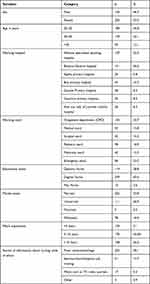 |
Table 1 Sociodemographic Characteristics of Professional Nurses Working in Public Hospitals of Gurage Zone, SNNPR, Ethiopia, 2022 |
The current study’s findings show that, 55.7% of the nursing practitioners had adequate awareness of the nursing code of ethics. Even though there were not many participants in the research who had good knowledge overall, several of the items had greater outcomes when each of the knowledge’s component parts was looked at separately. For instance, it was found that a higher proportion of nursing staff were aware of the patient’s right to respectful treatment (100%) and the patient’s right to receive complete and up-to-date information about his diagnosis, treatment, and prognosis from his care provider (94.9%) (Table 2 and Figure 1).
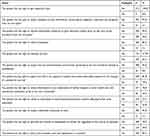 |
Table 2 Distribution of Knowledge on Ethical Codes of Nursing Among Professional Nurses Working in Public Hospitals of Gurage Zone, SNNPR, Ethiopia, 2022 |
 |
Figure 1 Knowledge of nursing professionals towards nursing code of ethics working in public hospitals of Gurage zone, SNNPR, Ethiopia, 2022 (n=413). |
According to the current study’s findings, 46% of the nursing professionals had good attitudes regarding the nursing code of ethics. When each of the various components of attitude was looked at, similar lower findings were also observed in almost all of the items (Table 3 and Figure 2).
 |
Table 3 Attitude of Professional Nurses on Ethical Codes of Nursing Working in Public Governmental Hospitals of Gurage Zone, SNNPR, Ethiopia, 2022 |
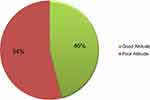 |
Figure 2 Level of attitude of professional nurses towards ethical codes of nursing working in public hospitals of Gurage zone, SNNPR, Ethiopia, 2022. |
Nursing Code of Ethics Practice
Overall, 53% of the nursing practitioners were deemed to have good nursing code of ethics practice. About 56.9% of the nurses self-reported that as they had supervision system to report incompetent nursing ethical practices (Table 4 and Figure 3). To support the findings of self-reported practice, covert observation on eight components of nursing ethics were employed using observational checklist. Accordingly, good practice is observed in some components such as hair, hand and nail hygiene keeping practice (63%) and timely administration of medication (64%) (Table 5).
 |
Table 4 Ethical Codes of Nursing Practice Among Professional Nurses Working in Public Governmental Hospitals of Gurage Zone, SNNPR, Ethiopia, 2022 |
 |
Table 5 Covert Observational Findings on Ethical Codes of Nursing Practice Among Professional Nurses Working in Public Hospitals of Gurage Zone, SNNPR, Ethiopia, 2022 |
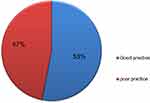 |
Figure 3 Nursing code of ethics practice among nursing professionals working in public hospitals of Gurage zone, SNNPR, Ethiopia, 2022 (n=413). |
Factors Associated with Nursing Code Ethics Practice
In the bivariate analysis sex, working ward, marital status, year of work experience, nurses provided with updated training, nurses having frequent supportive supervision system, knowledge and attitude on nursing code of ethics were significantly associated with nursing code of ethics practice. However, when these variables were analyzed together in the multivariate analysis using backward logistic regression method, sex, working ward, year of working experience, training and nurses who had frequent supportive supervision system were found to be statistically significant (Table 6).
Discussion
Codes of ethics serve as essential guidelines for nursing practice, supporting clinical nurses in their intricate roles in patient care. On the other hand, nurses are in charge of giving their patients/clients high-quality, ethically competent care.
For nations like Ethiopia, where resources are low and nursing staffs are understaffed, adhering to the nursing code of ethics is not an easy feat.
The current study’s findings showed that 55.7% of the nursing practitioners had sufficient knowledge of the nursing code of ethics. Our results were slightly higher than those of studies in Port Said (46.3%),9 Nepal (45%)10 and Zagazig Hospitals (40%).12 Current results, however, are less significant than those of a Pokhara research (65.1%).11 This can be attributed to differences in the study time, sample size, and measuring methods.
This study publicized statistically as, there is no substantial link between nursing code of ethics practice and practitioners’ knowledge and attitudes which is in line with a Pokhara study11 and contradicts with a study conducted in Zagazig Hospitals.12 This might be due to a professional nurse’s knowledge and attitudes are not the only factors that influence how they adhere to the nursing code of ethics.
The existence of well-established systems, the organizational atmosphere regarding customer safety, the quality of the leadership, peer pressure, workload, the presence of role models, and general management support can also have an impact.
The current study also depicted that, 53% of the nursing professionals as a whole demonstrated good practice with the nursing code of ethics. This result was in line with the research conducted in Nepal (50%)15 and was much lower when compared to research conducted in Port Said (78.8%),9 Pokhara (76.4%),11 and Zagazig Hospitals working nurses (97.8%)12 who had good professional ethical practices. This may be a result of socioeconomic, cultural, organizational, and customer safety maintenance experiences, as well as leadership quality, peer pressure, workload, the existence of role models, and management support disparities.
In this study, compared to male nurses, female nursing professionals had a 3.69 times higher likelihood of adhering to a nursing code of ethics. It might be because female employees have a natural tendency to follow organizational rules and regulations most of the time, as well as they are more cautious about engaging in unethical behavior.
Compared to nurses working in outpatient departments, those working in surgical wards were 4.84 times more likely to have good practice with the nursing code of ethics. This may be because the number of patients admitted to the surgical ward was small, there were enough of nurses on duty, and the surgical ward required more precautions in order to preserve lives.
Compared to nurses working in the outpatient department, professionals working in the pediatric ward are 0.36 times less likely to adhere to the nursing code of ethics. This could be as a result of nurses and parents being heavily responsible for the care of children and youngsters not knowing their rights and obligations.
Furthermore, compared to nursing professionals with less than 5 years of work experience, those with years of work experience between 5 and 10 years are 2.08 times more likely, and those with 10 years or more are 3.49 times more likely, to have good nursing code of ethics practice. This may be because nurses become more professional as their work experience grows.
In comparison to those who did not get training, nursing practitioners who attended seminars or workshops on nursing ethics were 5.02 times more likely to practice the nursing code of ethics well. Furthermore, nurses who work in hospitals with frequent supervision systems are 2.27 times more likely to have followed the nursing code of ethics practice than nurses who work in hospitals without frequent supervision systems. This might be due to the fact that management bodies could play a key role and are responsible for making a sustainable system and maintaining social control and norm.
Strengths and Limitations
This study used a high number of nursing practioners and use of covert observational study using checklist to assess nursing ethics practice. The limitation of this study may be related to nature of cross-sectional study which did not draw inferences and show cause and effect relations among variables.
Conclusions
Closely half of the nurses in this research had good nursing code of ethics practice. Sex, working ward, years of working experience, nurses who had training and nurses who had frequent supportive supervision system were significantly associated with the nursing code of ethics practice. As a result, it is strongly advised that all stakeholders have a frequent supportive supervisory system in place, as well as providing training to staff nurses through workshops and seminars.
Abbreviation
ANA, American Nurses Association; CRC, compassionate and respectful care; ICN, international code of ethics; FGDs, Focus Group Discussion; OPDs, outpatient departments; SNNPR, Southern Nations, Nationalities, and People’s Region; SPSS, Statistical Package for Social Science.
Data Sharing Statement
The datasets used and analyzed during the current study are available from the corresponding author on a reasonable request.
Ethics Approval and Consent to Participate
Ethical clearance was obtained from Wolkite University Ethical Review Board (ERB) and a permission letter was obtained from the nursing department. Following the permission, participants were briefed about the study purpose and the procedure of the data collection process. The responders gave their written informed consent. The study participants’ privacy and the confidentiality of the information were both respected.
Acknowledgments
First of all, my deepest gratitude goes to Wolkite University College of Medicine and the Health Science Department of Nursing Research's Ethical Review committee for providing this opportunity. Then, I extend my heartfelt thanks to all hospital managers, team leaders, study participants and data collectors for their unreserved and tireless support during the whole study period.
Funding
The author received no financial support for the research, authorship and/or publication of this article.
Disclosure
The author declared no conflicts of interest in relation to this work nor with respect to the research, authorship, and/or publication of this article.
References
1. Trobec I, Starcic AI. Developing nursing ethical competences online versus in the traditional classroom. Nursing Ethics. 2015;22(3):352–366. doi:10.1177/0969733014533241
2. Epstein B, Turner M. The nursing code of ethics: its value, its history. OJIN Online J Issues Nurs. 2015;20(2):1–10.
3. Zahedi F, Sanjari M, Aala M, et al. The code of ethics for nurses. Iran J Public Health. 2013;42(Supple1):1.
4. Žydžiūnaitė V, Suominen T, Åstedt-Kurki P, Lepaitė D. Ethical dilemmas concerning decision-making within health care leadership: a systematic literature review. Medicina. 2010;46(9):595. doi:10.3390/medicina46090084
5. International Council of Nurses The ICN Code of Ethics for Nurses. 2006. Available from: http://www.icn.ch/images/stories/documents/about/icncode_english.pdf.
6. Association AN. Code of Ethics for Nurses with Interpretive Statements. Nursesbooks. org; 2001.
7. Canadian nurse association code of ethics for registered nurse. 2008. Available from: http://www.cna-nurses.ca/CNA/documents/pdf/publications/Code_of_Ethics_2008_e.pdf.
8. Aydin ER, Ersoy N. Ethical problems experienced by nurses who work in psychiatry clinics in Turkey. J Psychiatric Nursing. 2017;8(2):548.
9. Hassan MEL-G. Effat Mohamed El -Karmalawy and Mona Abdel-Sabour Hassan. Assessment of Professional Ethics Practiced By Nurses Working In Primary Health Care Centers in Port Said. J Am Sci. 2012;8(12):1357–1365.
10. Shrestha S, Jose P. Knowledge & practice of nursing ethics and laws. J Univ College Med Sci. 2014;2(3):30–33. doi:10.3126/jucms.v2i3.11825
11. Timilsina A, Bhagawati KC. Level of knowledge and practice of patient care ethics among nurses in Pokhara. Janapriya J Interdiscip Stud. 2017;6:17–28. doi:10.3126/jjis.v6i0.19306
12. Ali WA, Ali SA, Mahmoud SF. Professional ethics practiced by nurses working in hemodialysis unit at Zagazig Hospitals. Zagazig Nursing Journal. 2018;14(1):221–232.
13. Aliyu D, Adeleke IT, Omoniyi SO, Samaila BA, Adamu A, Abubakar AY. Knowledge, attitude and practice of nursing ethics and law among nurses at Federal Medical Centre, Bida. Am J Health Re. 2015;3(1):32–37. doi:10.11648/j.ajhr.s.2015030101.15
14. Khandan M, Abbaszadeh A, Bahrampoor A. The relationship between nurses’ awareness and attitude about ethics codes and determining the effective factors. Med Sci J Islamic Azad Univ. 2015;25(4):299–304.
15. Paudel Subedi KK, Timalsina K, Bhele RL. Nurse’s awareness on ethico-legal aspects of nursing profession. J Nepal Health Res Counc. 2018;16(1):49–52. doi:10.3126/jnhrc.v16i1.19363
16. Hamid S, Kanwal R, Bajwa MH, Khalid S, Mubarak H. Ethical issues faced by nurses during nursing practice in district Layyah, Pakistan. Diversity Equality Health Care. 2016;13(4):302–308. doi:10.21767/2049-5471.100068
 © 2022 The Author(s). This work is published and licensed by Dove Medical Press Limited. The full terms of this license are available at https://www.dovepress.com/terms.php and incorporate the Creative Commons Attribution - Non Commercial (unported, v3.0) License.
By accessing the work you hereby accept the Terms. Non-commercial uses of the work are permitted without any further permission from Dove Medical Press Limited, provided the work is properly attributed. For permission for commercial use of this work, please see paragraphs 4.2 and 5 of our Terms.
© 2022 The Author(s). This work is published and licensed by Dove Medical Press Limited. The full terms of this license are available at https://www.dovepress.com/terms.php and incorporate the Creative Commons Attribution - Non Commercial (unported, v3.0) License.
By accessing the work you hereby accept the Terms. Non-commercial uses of the work are permitted without any further permission from Dove Medical Press Limited, provided the work is properly attributed. For permission for commercial use of this work, please see paragraphs 4.2 and 5 of our Terms.



